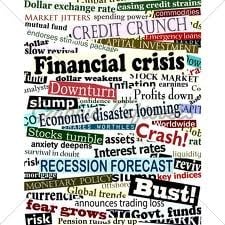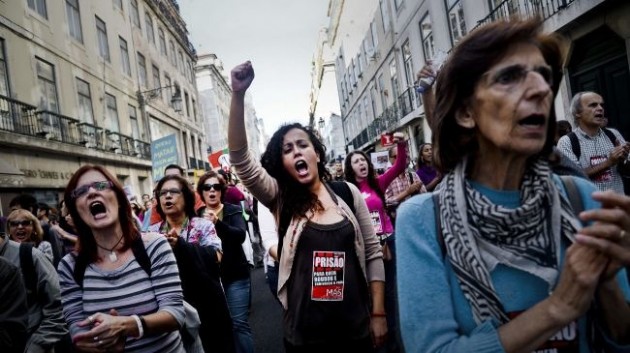Language During the Financial Crisis
 Times of crisis and social change are traditionally peak times for the genesis of new words as people adapt to hard situations and languages follow suit. For example, the term “selfie” has just recently been declared the Oxford Dictionary’s word of the year, suggesting that the trials and tribulations of people with no one to take pictures of them have become so excruciating that snapping self-portraits with one’s iPhone has become a widespread coping mechanism. In a similar vein of thinking, the past six years of recession in Europe have resulted in the creation of various new words having to do with debt, employment, finances, and protest.
Times of crisis and social change are traditionally peak times for the genesis of new words as people adapt to hard situations and languages follow suit. For example, the term “selfie” has just recently been declared the Oxford Dictionary’s word of the year, suggesting that the trials and tribulations of people with no one to take pictures of them have become so excruciating that snapping self-portraits with one’s iPhone has become a widespread coping mechanism. In a similar vein of thinking, the past six years of recession in Europe have resulted in the creation of various new words having to do with debt, employment, finances, and protest.
Not surprisingly, some of the choicest terms come from the countries hit hardest by the Crisis. In Spain after four years of bailouts, the term hombres de negro, or “men in black,” has become an ominous code word for the European Union officials. The Spanish words burbuja, meaning “economic bubble,” and población activa, which refers to the portion of the population who are of working age but unable to find work, are common buzzwords. Spain’s “lost generation,” their recent university graduates who can’t find work—youth unemployment rates exceeded 56% over the summer—are now being referred to as the Ni-Ni generation, meaning they neither work nor study. Many of them have banded together to form the social movement los indignados, or “the indignants,” who have been leading a nationwide protest about the economic situation. The scope of Spanish protestors are so vast that they can be classified as yayoflautas, or “old flutes,” meaning the elderly generation, and marea blanca, or “the white tide,” meaning the wave of doctors and nurses protesting cuts to public healthcare.
In Portugal, another country in dire financial straits, their youth population is called geração à rascal, or “the distressed generation.” The verb grandolar has also taken form, meaning to protest by singing the 1974 revolutionary song, “Grândola Vila Morena.” In Greece, a country which has seen excessive bailouts, austerity measures, and rioting over unemployment levels, the name Tzambaman has come into use to describe someone stingy with money or apt to mooch off of others. Also commonly used is the tongue-in-cheek term neoptohi, or “new poor,” much more prevalent in Greek society than the nouveau riche.
 On the opposite side of things, Germany has coined the term Schuldenbremse to refer to the measures taken to limit a country’s debt, while French has phrases such as perte du triple A, or the loss of France’s triple A bond rating, choc de compétitivité, meaning the sudden shock or explosion in job competitiveness, and the umbrella term depressionnisme, meaning the change in mindset—often for the darker and more pessimistic—people all across the continent are undergoing in light of economic difficulties. For example, in Portugal, a woman in a short skirt may be sarcastically asked if she’s in austerity, that is, saving the rest of her cloth.
On the opposite side of things, Germany has coined the term Schuldenbremse to refer to the measures taken to limit a country’s debt, while French has phrases such as perte du triple A, or the loss of France’s triple A bond rating, choc de compétitivité, meaning the sudden shock or explosion in job competitiveness, and the umbrella term depressionnisme, meaning the change in mindset—often for the darker and more pessimistic—people all across the continent are undergoing in light of economic difficulties. For example, in Portugal, a woman in a short skirt may be sarcastically asked if she’s in austerity, that is, saving the rest of her cloth.
While none of these terms have caught on in the United States, this phenomenon of recessionary words is familiar to us as well. During the Great Depression, we coined terms such as “Hooverville,” meaning shantytowns built by homeless people, and “Okie,” referring to the indigent families migrating west from Oklahoma. The term “stagflation,” while originally attributed to a British economic minister, caught on famously in the United States in reaction to our recession of the 1970s. Even the term “hobo,” thought to be a contraction of “homeward bound” or “homeless boy,” or even a misspelling of the greeting among turn of the century railroad workers, “Ho, beau!” was popularized during the 1930s, due to the sheer number of hobos wandering the country.
What other economically-themed slang terms can you think of?
